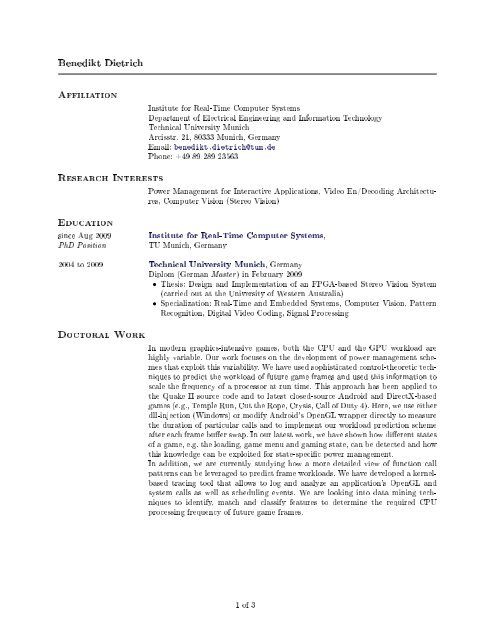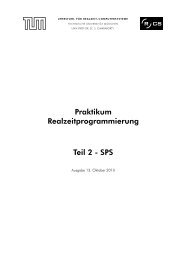a CV - Institute for Real-Time Computer Systems - TUM
a CV - Institute for Real-Time Computer Systems - TUM
a CV - Institute for Real-Time Computer Systems - TUM
You also want an ePaper? Increase the reach of your titles
YUMPU automatically turns print PDFs into web optimized ePapers that Google loves.
Benedikt Dietrich<br />
Affiliation<br />
<strong>Institute</strong> <strong>for</strong> <strong>Real</strong>-<strong>Time</strong> <strong>Computer</strong> <strong>Systems</strong><br />
Department of Electrical Engineering and In<strong>for</strong>mation Technology<br />
Technical University Munich<br />
Arcisstr. 21, 80333 Munich, Germany<br />
Email: benedikt.dietrich@tum.de<br />
Phone: +49 89 289 23563<br />
Research Interests<br />
Power Management <strong>for</strong> Interactive Applications, Video En/Decoding Architectures,<br />
<strong>Computer</strong> Vision (Stereo Vision)<br />
Education<br />
since Aug 2009<br />
PhD Position<br />
2004 to 2009<br />
<strong>Institute</strong> <strong>for</strong> <strong>Real</strong>-<strong>Time</strong> <strong>Computer</strong> <strong>Systems</strong>,<br />
TU Munich, Germany<br />
Technical University Munich, Germany<br />
Diplom (German Master) in February 2009<br />
• Thesis: Design and Implementation of an FPGA-based Stereo Vision System<br />
(carried out at the University of Western Australia)<br />
• Specialization: <strong>Real</strong>-<strong>Time</strong> and Embedded <strong>Systems</strong>, <strong>Computer</strong> Vision, Pattern<br />
Recognition, Digital Video Coding, Signal Processing<br />
Doctoral Work<br />
In modern graphics-intensive games, both the CPU and the GPU workload are<br />
highly variable. Our work focuses on the development of power management schemes<br />
that exploit this variability. We have used sophisticated control-theoretic techniques<br />
to predict the workload of future game frames and used this in<strong>for</strong>mation to<br />
scale the frequency of a processor at run time. This approach has been applied to<br />
the Quake II source code and to latest closed-source Android and DirectX-based<br />
games (e.g., Temple Run, Cut the Rope, Crysis, Call of Duty 4). Here, we use either<br />
dll-injection (Windows) or modify Android's OpenGL wrapper directly to measure<br />
the duration of particular calls and to implement our workload prediction scheme<br />
after each frame buer swap. In our latest work, we have shown how dierent states<br />
of a game, e.g. the loading, game menu and gaming state, can be detected and how<br />
this knowledge can be exploited <strong>for</strong> state-specic power management.<br />
In addition, we are currently studying how a more detailed view of function call<br />
patterns can be leveraged to predict frame workloads. We have developed a kernelbased<br />
tracing tool that allows to log and analyze an application's OpenGL and<br />
system calls as well as scheduling events. We are looking into data mining techniques<br />
to identify, match and classify features to determine the required CPU<br />
processing frequency of future game frames.<br />
1 of 3
Professional Experience<br />
Sep to Nov 2011<br />
Internship<br />
NVIDIA,<br />
Santa Clara, United States<br />
Development of the Instant Replay Feature ShadowPlay<br />
since Aug 2009<br />
Research Assistant<br />
2008 to 2009<br />
Student Assistant<br />
Sep to Dec 2007<br />
Student Assistant<br />
Mar to Apr 2006<br />
& Sep to Oct 2006<br />
Internship<br />
<strong>Institute</strong> <strong>for</strong> <strong>Real</strong>-<strong>Time</strong> <strong>Computer</strong> <strong>Systems</strong>,<br />
TU Munich, Germany<br />
Robotics and Automation Lab, University of Western Australia<br />
Design and Implementation of an FPGA-based Stereo Vision System<br />
<strong>Institute</strong> <strong>for</strong> <strong>Real</strong>-<strong>Time</strong> <strong>Computer</strong> <strong>Systems</strong>, TU Munich, Germany<br />
Hard- and software design of an foot-mounted inertial measurement device<br />
IFEN GmbH, Poing, Germany<br />
PCB Layout of a Galileo (global navigation satellite system) E1 software receiver<br />
Awards and Scholarships<br />
2013<br />
Best Demo Award <strong>for</strong> Power Management using Game State Detection on Android<br />
Smartphones at MobiSys 2013<br />
2008<br />
DAAD Scholarship <strong>for</strong> Diploma Thesis abroad<br />
Publications<br />
2013<br />
DEMO: Power Management using Game State Detection on Android Smartphones<br />
(Benedikt Dietrich, Samarjit Chakraborty), In 11th International Conference on<br />
Mobile <strong>Systems</strong> (MobiSys), Taipei, Taiwan, 2013.<br />
Let's put the Car in your Phone! (Martin Geier, Martin Becker, Daniel Yunge,<br />
Benedikt Dietrich, Reinhard Schneider, Dip Goswami, Samarjit Chakraborty), In<br />
50th Design Automation Conference (DAC), Austin, USA, 2013.<br />
2012<br />
2010<br />
Managing Power <strong>for</strong> Closed-Source Android OS Games by Lightweight Graphics<br />
Instrumentation (Benedikt Dietrich, Samarjit Chakraborty), In NETGAMES, Venice,<br />
Italy, 2012.<br />
LMS-based Low-Complexity Game Workload Prediction <strong>for</strong> DVFS (Benedikt Dietrich,<br />
Swaroop Nunna, Dip Goswami, Samarjit Chakraborty, Matthias Gries), In<br />
28th IEEE International Conference on <strong>Computer</strong> Design (ICCD), Amsterdam,<br />
Netherlands, 2010.<br />
2 of 3
Talks<br />
Jul 2013<br />
Jun 2013<br />
Jun 2013<br />
Nov 2012<br />
Nov 2012<br />
Oct 2010<br />
Power Management Using Game State Detection on Android Smartphones,<br />
at National Tsing Hua University (NTHU), Taiwan<br />
User-behavior Driven Power Management <strong>for</strong> Mobile Games,<br />
at National Taiwan University (NTU), Taiwan<br />
DEMO: Power Management Using Game State Detection on Android Smartphones,<br />
at MobiSys, Taiwan<br />
Forget your handheld's battery, just play games!,<br />
at Intel Microprocessor Labs Braunschweig, Germany<br />
Managing Power <strong>for</strong> Closed-Source Android OS Games by Lightweight Graphics<br />
Instrumentation, at NETGAMES, Venice, Italy<br />
LMS-based Low-Complexity Game Workload Prediction <strong>for</strong> DVFS,<br />
at ICCD, Amsterdam, Netherlands<br />
Teaching<br />
since 2010<br />
Teaching Assistant<br />
since 2009<br />
Teaching Assistant<br />
2008<br />
Lab Assistant<br />
Embedded <strong>Systems</strong>,<br />
Nanyang Technological University (NTU), Singapore<br />
<strong>Real</strong>-time and Embedded <strong>Systems</strong> 1 & 2,<br />
TU Munich, Germany<br />
Digital <strong>Systems</strong> Lab,<br />
University of Western Australia (UWA), Australia<br />
Technical Skills<br />
Programming<br />
C/C++, Java, Android-based programming (Kernel & Userspace), Embedded programming,<br />
DirectX/OpenGL, Linux & Windows programming, Matlab, VHDL<br />
Applications<br />
Hardware<br />
Eclipse, Microsoft Visual Studio, Matlab, SimpleScalar, Xilinx ISE, ModelSim, Altium<br />
Designer, Eagle, National Instruments LabView<br />
Xilinx FPGA Design, Microcontrollers (ARM, MSP430, AVR, etc.), Circuit Design,<br />
PCB layout<br />
Contact References<br />
Prof. Samarjit Chakraborty (PhD Supervisor)<br />
<strong>Institute</strong> <strong>for</strong> <strong>Real</strong>-<strong>Time</strong> <strong>Computer</strong> <strong>Systems</strong><br />
Technical University Munich<br />
Arcisstr. 21, 80333 Munich, Germany<br />
Email: samarjit@tum.de<br />
Phone: +49 89 289-23551<br />
Dr. Santanu Dutta (Supervisor at NVIDIA)<br />
NVIDIA<br />
2701 San Tomas Expressway, Santa Clara<br />
CA 95050, United States<br />
Email: sdutta@nvidia.com<br />
Phone: +1-408-702-8346<br />
3 of 3



